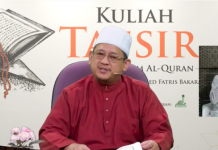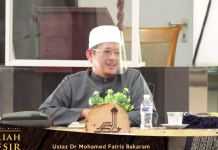بسم الله الرحمن الرحيم
Bismi-llāhi r-raḥmāni r-raḥīm
In the name of Allah, Most Gracious, Most Merciful
اللهم صلي على سيدنا محمد وعلى اله وصحبه وسلم
Allahumma salli ala Sayyidina Muhammad wa ala alihi wa sahbihi wasallim
O Allah, send your peace and blessings upon our Master Muhammad and upon his family and companions
Lessons from Surah Al-Mu’minun (Verses 73-76)
This article is a summary of takeaways from Ustaz Dr Mohamed Fatris Bakaram’s Tafsir Online Lecture on 22nd November 2020. Summaries of previous lectures on Surah Maryam, Surah Taha, Surah Al-Anbiya’ and Surah Al-Hajj can be found here. The previous lecture of Surah Al-Mu’minun can be found here.
Recap of previous verses
In the previous lectures of Surah Al-Mu’minun, we have come across the stories of many prophets of the past and how their people were destroyed due to their stubborn arrogance in rejecting the truth. Last week, we heard of how Allah SWT addressed and criticised the Quraysh who were themselves being stubborn in rejecting Prophet Muhammad SAW’s message.
They had refused to reflect upon the Qur’an, giving multiple excuses such as being given a guaranteed safety that had not been conferred upon their ancestors, or that they no longer recognise Muhammad SAW, or that Muhammad SAW has become insane. These were mere excuses given by the Quraysh as they continued to deny the truth.
Continuation of the Tafsir of Surah Al-Mu’minun
وَإِنَّكَ لَتَدْعُوهُمْ إِلَىٰ صِرَٰطٍۢ مُّسْتَقِيمٍۢ
Indeed, you are calling them to a straight path, [23:73]
وَإِنَّ ٱلَّذِينَ لَا يُؤْمِنُونَ بِٱلْـَٔاخِرَةِ عَنِ ٱلصِّرَٰطِ لَنَـٰكِبُونَ
but those who disbelieve in the Hereafter are certainly deviating from that path. [23:74]
Two Groups of People
These verses serve as a closure to last week’s lesson and an opening to today’s lesson. In his Tafsir book, Imam Ibn Kathir linked these verses to a hadith as explained in the previous lecture. In the hadith, Rasulullah SAW saw himself in a dream where two angels discussed a metaphor for him SAW. This metaphor highlighted to us the two groups of people who receive Allah’s message in this world.
One of which chose the Akhirah (Hereafter) over today, while the other chose the life of this world and sacrificed the life of the Hereafter. The role of the Prophet SAW is to guide human beings towards Allah SWT’s path, a path that would lead to Allah’s Paradise with its’ ease and comfort. Yet, there are people to choose to reject Rasulullah SAW and stray away from the right path. These people are the worst of losers in this world and the next.
Insects that Flock to Fire
Imam Ibn Kathir gives us another narration to support this hadith that can be useful in navigating this life filled with trials, challenges and distractions that make us forget our ultimate destination.
Rasulullah SAW mentions in this hadith that verily, he SAW is like someone who holds firmly onto our clothes, repeatedly warning us to stay away from the fire. Unfortunately, we are too strong such that we almost free ourselves from his SAW’s grasp because we are so eager to go towards the fire.
We are like insects that rush towards the fire, desperately seeking light. We all know of insects like these, that flock around the lights at night. When they rush to the fire, they think it is something good, but only end up destroying themselves.
Back in the Kampung, we used to put a plate of water beneath a lamp so that these insects will rush into the lamp’s reflection on the water surface and die. This was how we would rid the area of hundreds of flies at once, so that they would leave us alone at night.
Rasulullah SAW wants to save us. He wants to protect us from the hellfire. But we, as human beings, are the ones who prefer following the light that deceives us. We choose to go towards the very thing that would harm us.
This is a reminder for us so that we may never forget how difficult Rasulullah SAW has fought and sacrificed for us. He SAW could have lived an easy life, however out of his love for us, he went through many hardships, mockery, threats, and assaults upon himself.
Rasulullah SAW did not want to see us suffer – neither in this world or in the hereafter. Have a look at your own selves: What is your attitude? Do you reciprocate the love of Rasulullah SAW? Or are you arrogant against his teachings, choosing that which brings us loss instead of benefit?
People Who Cannot be Helped
Rasulullah SAW then mentions that in the Hereafter, he will go ahead of all of us at the well of Al-Haudh. This same well has been referred to as Al-Kauthar in the Qur’an. In another hadith, Rasulullah SAW said that whoever drinks from his well will never feel thirsty forever.
So, while Rasulullah SAW is at his well, we will come to him, whether as individuals or groups of various sizes. He SAW mentions that he will recognise us based on the characteristics that he has seen on the people who come to him. He SAW would recognise certain people by name.
He watched the people arriving and he SAW recognised them – may we be amongst them. He recognised them by the characteristics and qualities that they portrayed. May we return to Rasulullah SAW with faces that are lit up, because of our wudhu’, our obedience and our Salah.
Rasulullah SAW will recognise us based on those features. And he SAW will recognise us by our names. My dear brothers and sisters, he SAW knows our names!
Rasulullah SAW says that he is like the owner of camels, as the camel’s master, he recognises each one of them. This is so much so that if he had a huge flock of camels, and right in the middle of the flock there were to be a single camel that did not belong to him, he would immediately recognise it.
To other people, all the camels would look the same; but to the owner, each of them is distinct. What this means is that at that moment, when people will come in flocks asking for the Syafa’a (intercession) of Rasulullah SAW, if we were to be amongst these people and if we were to not be deserving of the blessing of being quenched by his well, Rasulullah SAW would immediately recognise us.
He would point us out and say that we are not from His Ummah SAW. We ask Allah SWT that He distances us from not being counted as the Ummah of Rasulullah SAW. Ameen.
Rasulullah SAW then continues saying that at that moment, people will be in chaos, being lost and not knowing how to retrieve the well. There will be some amongst the Ummah of Rasulullah SAW who will be walking aimlessly, not reaching the Well where Rasulullah SAW will stand waiting.
At that moment, Rasulullah SAW would ask Allah on our behalf, “O my Rabb, that is my people. That is my Ummah”. Allah SWT will then reply, “O Muhammad, you don’t know what they have done after you left. After you left, they turned away to leave you O Muhammad.”
What does this mean? These are people who followed you, O Muhammad, for only a short while. When you left, whatever your commands were not held onto, the book that you recited was not taken seriously… These were the people who did all sorts of things in your absence. May we be protected from falling into this group of people, who act against the teachings of Rasulullah SAW. Ameen.
There will then come to Rasulullah SAW a group of people being weighed down, carrying a sheep each. The sheep will be wailing out. These people will call out to him SAW “Ya Muhammad! Ya Muhammad!”. But Rasulullah SAW will not be able to do anything for them to help them out.
Rasulullah SAW would say that he used to bring reminders and they chose not to listen. He would warn them, and they refused to take heed. He had guided them, and they ignored it. He will then see people carrying camels on their backs. The camels will be wailing, and the people will call towards Rasulullah SAW.
His SAW’s response would be similar. Another group of people would have the load of a wailing horse on their back. Once again, Rasulullah SAW would be unable to answer their pleas. Another group would be carrying a huge skin water sack, one that was commonly used at the time to old water for long voyages. Rasulullah SAW would not be able to help them out.
This hadith pictures to us that there will be people who will come in the Hereafter with the burden of their terrible deeds in this world. Perhaps they had oppressed people throughout their life. Perhaps they had taken what was not theirs. Perhaps they had encroached upon the rights of others.
Whether a sheep, a camel, a horse, or even water that did not belong to them… if they had unjustly taken what was not theirs in this world, then it becomes their burden to carry in the Hereafter. Even if they were to come to Rasulullah SAW to ask for salvation, he SAW would not be able to do anything. The oppression had already been done in this world.
Remember the Love of Rasulullah SAW for You
So, going back to verses 73 and 74 of Surah Al-Mu’minun, Allah SWT says that Rasulullah SAW’s job is only to call to the straight path. And those who refuse to believe in the Hereafter are deviating from the straight path. Let us not let any of these stories shared in the hadith become our stories. May we be saved. Blossom the love of Rasulullah SAW in your hearts.
If you remember, in another hadith, Rasulullah SAW expressed is eagerness to meet “his brothers”. The companions had asked him, “Are we not your brothers?”; to which his response was, “You are my companions. My brothers are those who have not yet come, those who come after I have gone”. Rasulullah SAW yearned to meet with us, he missed us a lot. May we be granted that same desire and longing to meet him as well. Ameen.
When we make Salawat as the Ummah of Rasulullah SAW, feel the intimate bond that links you to him SAW. It is a truly special link. We do not make Salawat as someone who is distant, someone unsure of whether their Salawaat are heard and known by Rasulullah SAW.
In the hadith above, we know that Rasulullah SAW knows us, he recognises our features, and he even knows us by our name. It is not because he SAW knows the unknown. Rather, he SAW has been given the news by Allah SWT. When you make Salawat upon the Prophet SAW, know that Allah SWT is relaying our salaams to him SAW.
Rasulullah SAW recognises that “This Salaam comes to me from someone from my Ummah. From a man called Muhammad Fatris Bakaram.” Feel that within your hearts. Our names are being relayed to Rasulullah SAW. We are so lacking in not realising the true extent of Rasulullah SAW’s love for us… Astaghfirullah.
O Allah make us the Ummah of Your Prophet, Rasulullah SAW. Grant us the opportunity to be able to drink from his Well, O Allah. Grant us love such that through it we are able to receive the love of your Prophet SAW. Ameen.
How Do you React in the Face of Trial?
وَلَوْ رَحِمْنَـٰهُمْ وَكَشَفْنَا مَا بِهِم مِّن ضُرٍّۢ لَّلَجُّوا۟ فِى طُغْيَـٰنِهِمْ يَعْمَهُونَ
If We had mercy on (or pities) them and removed the distress which is on them, they would obstinately persist in their transgression, wandering blindly. [23:75]
In the Arabic language, someone who is physically blind is called “a’ma”, blindness is called “al-‘amyu”. In this verse, the word “al-‘amHu” is used. This implies that the blindness mentioned is not blindness of the eyes but blindness of the heart. This is the state of someone who chooses disbelief. After a calamity strikes, Allah looks to see if they choose to believe.
When Allah gives us a form of distress or suffering, it is a reminder for us from Allah – a sort of wake-up call so that we will rise and improve ourselves. Allah SWT says that those who disbelieve, regardless of how much Mercy Allah sends upon them, regardless whether Allah lifts the suffering from them, they will continue to remain on the path that leads them astray.
As believers, whenever a trial befalls us, whenever we feel hurt or a “pinch of love” from Allah SWT, take them as reminders to improve ourselves. Use this as an opportunity to reflect on our own faults, and not on Allah’s injustice towards us. Look at where you have sinned, what mistakes you have made, and how you can return to Him SWT.
In facing this global pandemic, how should we as Muslims react? We should remember and reflect. This is a trial from Allah SWT. This is something that has been determined to happen by Allah SWT.
When this pandemic hit us, our community, our country, and our world… it shows that Allah SWT wants to test us. He wants to see how we reflect upon ourselves and our mistakes as human beings, so that as a result of this test, we will rise to become a better servant of Allah SWT than we have been previously.
We want to become human beings who, despite not having loved and been close to Rasulullah SAW all our lives, now have intense love for him SAW. If we previously had not been grateful to Allah SWT, then now we want to be someone who feels embarrassed and ashamed whenever we forget to give thanks to Allah SWT.
If before the Covid-19 pandemic, we were someone who often disobeyed Allah SWT’s commands, then let us today rise to make this a reminder and act righteously. May Allah SWT lift this calamity from us, may He SWT eliminate the pandemic from the world, may we become servants of Allah who are way better today than we have been previously.
Who has been Seized by Punishment?
وَلَقَدْ أَخَذْنَـٰهُم بِٱلْعَذَابِ فَمَا ٱسْتَكَانُوا۟ لِرَبِّهِمْ وَمَا يَتَضَرَّعُونَ
We have already seized them with punishment, but they did not humble themselves to their Lord, nor did they invoke (Allah) with submission to Him. [23:76]
In this verse, Allah SWT says that Allah SWT has inflicted them with a punishment, and it did not cause them to submit. Who is this ‘them’ that Allah SWT refers to? We know that the previous verses spoke of the people of the past who had been punished by Allah SWT.
But the present verses speak of the Quraysh, people who were still alive and well in disbelief at the point of revelation. What punishment had already seized them? Tafsir scholar Imam Fakhruddin Ar-Razi in his book Mafatihul Ghaib interprets the word ‘they’ in three ways:
(1) This refers to people of the past. Even though the story has shifted to a dialogue with Quraysh, Allah SWT wants to remind them of the punishment that has befallen the previous Ummah of the past.
(2) This does not refer to the people of the past. Those who have received punishment in the past have already been destroyed. Their stories have ended. There was no action to take after their destruction. This verse spoke about them not humbling themselves after the punishment was inflicted upon them. So, it can only refer to the Quraysh. The audience for the present conversation.
The Quraysh have been Punished
Then the question raised is… where was the punishment? There was no massive earthquake or flood or loud scream that wiped out their entire population. Scholars say that there was in fact a punishment – it was their defeat in the Battle of Badr. They were defeated so badly that it left them in a state of bewilderment and shock. As a punishment for their arrogance and pride, Allah SWT presented them with a humiliating defeat during the battle.
I have mentioned previously how in their arrogance, the Quraysh had partied all night on the eve of the battle. The troops had so much confidence in their victory that they celebrated even before the war started. They danced, sang, and drank all night.
The next day, many of them met their deaths at the battle. Many leaders of the Quraysh were killed or made prisoners of war. The losses by these people were immense. So, the second opinion is that ‘they’ were the Quraysh, and their punishment was defeat in the Battle of Badr.
(3) This third opinion states that after the Hijrah, there was a period in Makkah where the Meccans were inflicted with a terrible famine. There was no food available at all. There was a time during the life of the Prophet SAW, when Sayidatina Khadijah RA was still alive, the Quraysh had boycotted the Muslims.
They were banned from trading and buying food. This period carried on for many days, to the point that Sayidatina Khadijah was weakened by starvation. This was a difficult period for the Muslims. What many of us do not know is that there was also a period of time, after the Muslims had migrated, where the disbelievers in Makkah also suffered from starvation. This period of famine is what scholars say is the punishment on the Quraysh.
The Story of Thumaamah
There is a story behind this opinion. There was a man called Thumaamah bin Uthaal. He was the leader of a big tribe that inhabited the Al-Yamaamah region. This was a huge area of land, unlike that which we find with the same name today. As the tribe’s leader, he was much respected by the whole population of Yamaamah.
Rasulullah SAW used to write letters to the leaders of the region to call them to Islam. When Thumaamah received that letter, he was enraged. He declared that if he were to ever meet this man called Muhammad, he was going to kill him.
One day, a patrolling troop from the Muslims, brought back with them a man and tied him to a pillar in the Prophet SAW’s mosque. Upon investigation, they found that the man was none other than Thumaamah. This was not any ordinary man.
The Yamaamah people were wealthy because they were the primary exporters of wheat to the whole Arab peninsula. All the flour that the Arabs consumed, whether in Makkah or Madinah, came from Yamaamah. So, when Rasulullah SAW found Thumaamah in such a state, he was shocked. He told the people not to do anything to him, got his family to prepare food for him and served him in the mosque.
The next day, Rasulullah SAW came to Thumaamah and asked him, “Is there anything you’d like to say?”. Thumaamah replied, “O Muhammad, if you choose to treat me well, then know that you are treating someone who knows how to be grateful. But if you kill me, know that you are killing someone with blood,”
He was saying that he is not like any other man, killing him would mean incurring the wrath of his people. They will come to seek revenge. He continued, “Thirdly, if what you desire is wealth, then you just have to give the word. The wealth of Yamaamah is yours.”. Rasulullah returned home without saying anything.
On the third day, Rasulullah SAW asked him the same thing. Thumaamah replied with the same three responses. To this, Rasulullah SAW said, “Free him”. There was no ransom letter given to his people to get a reward for his return. No demands for compensation. Rasulullah SAW just freed him.
Upon his freedom, Thumaamah did not immediately leave to go home. Instead, he looked for water, cleansed himself and then returned to Rasulullah SAW saying his Shahadah. He declared that there is no God but Allah and Muhammad is the Messenger of God.
There was no “Dakwah” done. There was no preaching, persuading, or bargaining being done. There was only one brief question asked and the same response given. For three consecutive days. There was no torture or punishment. No obligation to accept Islam.
Thumaamah was not locked up in a prison. He was tied to a pillar in the mosque. Not an empty mosque, but the Masjid Nabawi; this was a mosque that was buzzing with activity everyday day, where companions spent much of their time worshipping and learning.
Rasulullah SAW not only prayed at the mosque, he delivered lectures, he answered questions, he taught from the book of Allah, he housed the poor, he distributed charity… all of this was done at the mosque. Thumaamah observed and heard all of it. Rasulullah did not have to approach Thumaamah directly, he just left him to be. Thumaamah accepted the message effortlessly.
Before he returned home, Thumaamah expressed to Rasulullah SAW his intention to perform Umrah. He asked Rasulullah SAW for his permission. After getting advice on how to perform Umrah, Yamaamah headed for Makkah. He entered Masjidil Haraam declaring aloud “Labbaik Allahumma labbaik. Labbaik la sharika laka labbaik. Innal-hamda wa-nimata laka wal-mulk, la sharika laka!”. Even the Prophet SAW and his companions had not ever gotten the honour of performing Umrah. Thumaamah was the first person in the history of Islam to perform Umrah.
When the Quraysh recognised him, they asked him, “What has happened? Have you rejected the religion of our forefathers?”. Thumaamah replied, “No, I only accepted Islam and followed Muhammad SAW.”.
This may sound contradictory, seeing that most people think that accepting Islam would mean disowning the practice of their ancestors. However, Thumaamah did not see himself as doing something bad as denouncing a religion, instead, he was just choosing to follow that of Muhammad SAW.
At that moment, the youth of Quraysh were furious. One of them stood up to try to kill him out of anger. The seniors around stopped him, reminding him of Thumaamah’s status and honour. They knew that harming him would mean cutting off their food supply for good.
However, when Thumaamah was about to return home to Yamaamah, he declared that the wheat supply from Yamaamah to Makkah was going to be ceased immediately until the Meccans accepted Islam. At that point of time he was alone, without any guards. If any Meccans had attempted to kill him, nobody could save him. Yet he was firm in his declaration.
When he eventually arrived back home, he did as he said he would. The price of wheat skyrocketed. The majority of people could no longer afford wheat and starved. The ones who could, found that the limited stock eventually ran out. There were no longer any imports of wheat.
The Quraysh suffered just as they had made the Muslims suffer during the Boycott. It came to a point that they had nothing left to eat. During the Boycott, the Muslims used to cook dried leaves and twigs to satiate their hunger. During this period, the Quraysh went to the extent of spreading animal skin in blood and cooking it to eat. They had run out of meat and fruits. Many people started succumbing to illness and death.
It came to a point of time when Abu Sufyan was sent to Rasulullah SAW to bargain with him. Abu Sufyan said, “O Muhammad, you claim to have been sent as a Mercy to the worlds. Instead, look what you have done! You have killed many fathers during the battles.
Now, you are killing their sons out of starvation. Please instruct Thumaamah to stop what he is doing.” Rasulullah SAW was not the one who made that initial instruction. But he listened to the plea and request of the Meccans and sent a messenger to ask Thumaamah to resume the export of wheat to Makkah.
Upon the return of wheat to Makkah, what do you think happened? Did the Quraysh accept Islam? Did they repent on their ways and reflect on their misdeeds? No. They did not do any introspection, did not learn from their mistakes. In fact, they returned to their foul ways, even going to the extent of calling the ruler of Rome to destroy Madinah.
Final Takeaways
This is what was pictured by Allah SWT. The disbelievers had blackened hearts. Even if we had pitied them and had Mercy on them, there would be no difference made. They would continue to refuse the truth. They would continue seeking aid from their idols.
Take heed from this. We do not have major natural disasters or widespread suffering here in Singapore. However, we do get our own challenges and trials, whether at an individual, community, national or international level.
As a believer, we give thanks to Allah. Alhamdulillah. As the Ummah of Rasulullah SAW, Alhamdulillah. These are incredible blessings bestowed upon us. As human beings, we should let every trial that we come across only bring us a greater realisation of Allah’s Power. Every trial should bring us closer to Allah SWT.
May Allah SWT preserve us and bring us to the Siraat al-Mustaqim. Rasulullah SAW has tried his best to keep us on this straight path. Let us strive to stay on it and away from the Fire. May we continue to have Iman and Taqwa in our hearts. May we continue to be blessed with the gift of the love of the Prophet SAW in our hearts. Ameen.
I love you all. I love you my dear brothers and sisters. We will meet again next week insyaaAllah.
——————–
Summary by: Arina Adom
Arina Adom is a lover of learning who takes on the world with an open mind. Resourceful and adaptable, always ready to take on new challenges. Comfortable working with diverse groups of people, yet able to work independently. Thrives under pressure. Currently seeking a meaningful career that enables her to impact lives directly and bring about positive changes in the lives of others in the community.
Arina graduated with a degree in Science ( Hons ), Life Science from NUS. She is currently taking a diploma in Quran and Sunnah Studies from Al Zuhri.
Watch Kuliah Tafsir again at
Masjid Darul Makmur’s Youtube
Watch and follow Kuliah Tafsir weekly
every Sunday after solat Maghrib

organised by Masjid Darul Makmur
Your contributions are appreciated. Get more details by clicking the image below.











